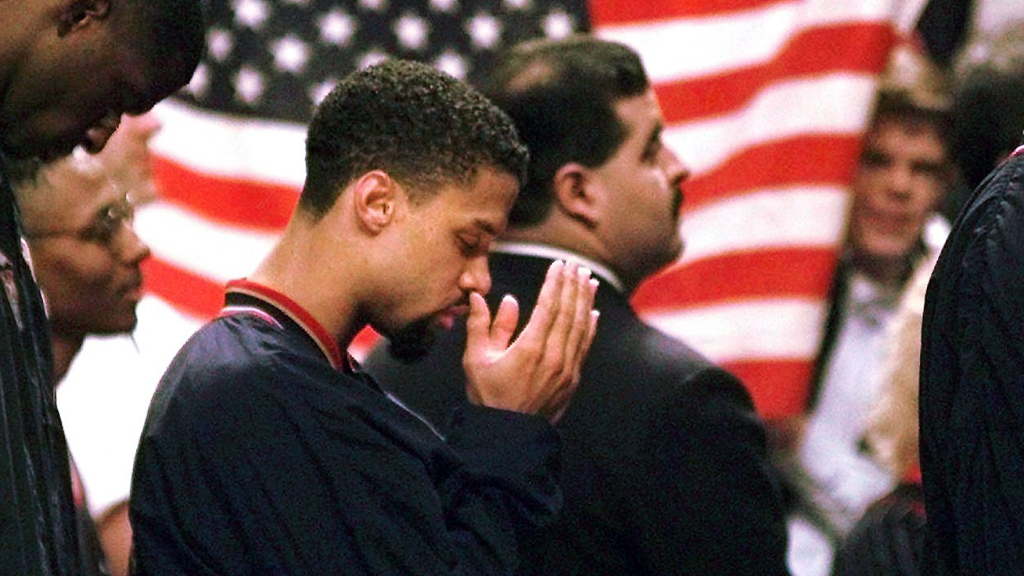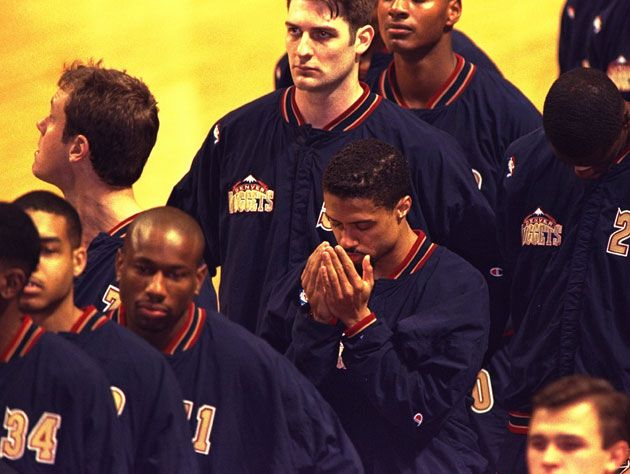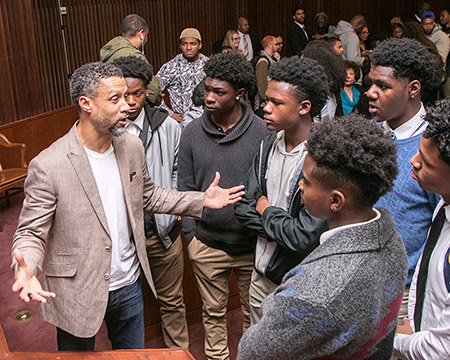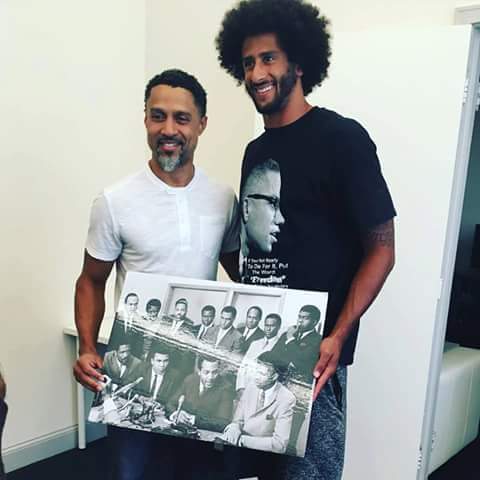

Before Colin Kaepernick, another professional athlete made headlines by protesting the national anthem 20 years ago.

Mahmoud Abdul-Rauf (born Chris Wayne Jackson on March 9, 1969) is a former American professional basketball player. Abdul-Rauf played basketball forGulfport High School in Gulfport, MS before enrolling at Louisiana State University to play college basketball for the Tigers.
His nine-year NBA career, spent with the Denver Nuggets, Sacramento Kings and Vancouver Grizzlies, was marked by an appearance in the Slam Dunk Contest as well as by one of the most accurate free-throw shooting records ever. Considered one of the greatest free-throw shooters in the history of the game, Abdul-Rauf missed the all time free-throw shooting NBA season record by only a single miss in the 1995–96 season. He sparked controversy for refusing to stand for the national anthem, and calling the flag of the United States a symbol of oppression.
Abdul-Rauf is perhaps best known for the controversy created when during the 1995-96 season, he refused to stand for “The Star-Spangled Banner” before games, stating that the flag was a symbol of oppression and that the United States had a long history of tyranny. He said that standing to the national anthem would, therefore, conflict with his Islamic beliefs. On March 12, 1996, the NBA suspended Abdul-Rauf for his refusal to stand, costing Abdul-Rauf $31,707 per missed game. Two days later, he worked out a compromise with the league, whereby he would stand during the playing of the national anthem but could close his eyes and look downward. He usually silently recited Islamic prayer during this time for those who are suffering from all works of life and ethnic backgrounds.

In an apparent publicity stunt linked to this controversy, four employees of Denver’s KBPI radio station were charged with misdemeanor offenses related to entering a Colorado mosque and playing “The Star-Spangled Banner” on a buigle and trumpet, in a provocative response to Abdul-Rauf’s refusal to stand for the national anthem. Like Abdul-Rauf, the DJs were briefly suspended but ultimately they publicly apologized and reconciled with the mosque community.
His playing time dropped. He lost his starting spot. After his contract expired in 1998, Abdul-Rauf couldn’t get so much as a tryout with any NBA team. He was just 29 years old.
“It’s a process of just trying to weed you out. This is what I feel is going to happen to [Kaepernick],” Abdul-Rauf said. “They begin to try to put you in vulnerable positions. They play with your minutes, trying to mess up your rhythm. Then they sit you more. Then what it looks like is, well, the guy just doesn’t have it anymore, so we trade him.”
“It’s kind of like a setup,” he said. “You know, trying to set you up to fail and so when they get rid of you, they can blame it on that as opposed to, it was really because he took these positions. They don’t want these type of examples to spread, so they’ve got to make an example of individuals like this.”
After the NBA shunned him, he played a season in Turkey, making about half of the $3.3 million he earned in the last year of his NBA contract. Abdul-Rauf caught on with the NBA’s Vancouver Grizzlies in 2000-2001, but played only 12 minutes per game. He never got another NBA opportunity, playing another six seasons in Russia, Italy, Greece, Saudi Arabia and Japan before retiring in 2011.
No Regrets

Twenty years later, despite losing prime years of NBA stardom, enduring death threats and having his home burned to the ground, Mahmoud Abdul-Rauf still does not stand for the national anthem.
The quicksilver guard who foreshadowed NFL quarterback Colin Kaepernick’s protest is now living in Atlanta, taking care of his five teenage children along with his ex-wife, training NBA players, and giving occasional speeches to groups in black or Muslim communities. At age 47, he has no regrets about choosing the difficult journey that Kaepernick is just starting.
“It’s priceless to know that I can go to sleep knowing that I stood to my principles,” Abdul-Rauf told The Undefeated. “Whether I go broke, whether they take my life, whatever it is, I stood on principles. To me, that is worth more than wealth and fame.”

Abdul-Rauf has never spoken to Kaepernick (picture above taken after this interview), and isn’t a football fan. But he supports the quarterback’s protest and message “1,000 percent,” saying that it created a valuable debate.
“It’s good to continue to draw people’s attention to what’s going on whether you’re an athlete, a politician, or a garbage man. These discussions are necessary,” he said. “Sometimes it takes people of that stature, athletes and entertainers, because the youth are drawn to them, [more than] teachers and professors, unfortunately.”
It all brings up strong memories of his own protest experience. That includes death threats by mail and telephone, and the letters “KKK” being spray-painted on a sign near the construction of his new house, five miles outside his hometown of Gulfport, Mississippi. His then-wife did not want to move into the 2,800-square-foot residence, and in 2001, while it was vacant and for sale, it was destroyed by fire.
“I want to live and die with a free conscience and a free soul when it’s all said and done. That’s the journey I’m on,” Abdul-Rauf said. “I had to make that decision for myself and I found that after I did that, it took off a huge weight. Do you get ridiculed? Do you hear the nonsense? Do people try to assassinate your character? Yes, but when it’s all said and done, you’re like, man, I feel good because I know that I’m standing on something that I believe in.”
In the 1990s, few athletes took stands on social issues, which made Abdul-Rauf an outlier. Today, Kaepernick’s protest is the latest move – and one of the boldest – in a resurgence of athlete activism.
“It is beautiful to see,” Abdul-Rauf said of the growing movement, “and it’s going to be hard to stop.”
A highlights clip of the player the NBA didn’t want anymore due to his political stance:
